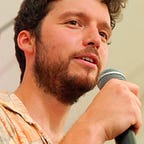What’s the optimum optimisation?
How do we judge if a TV programme was a good one?
If one show had a million viewers, and another had 10 million, which was the better show?
We humans love to use simple summary metrics for things, and once we’ve decided upon them, we are remarkably good at optimising for them. We organise very effectively around them as simple, unifying goals.
For many decades, we have optimised for the “yield” of our crops, and the consequence is that vegetables in supermarkets are now very big.
However, we’re now realising that this has had an enormously negative impact on the healthiness of our food. For example, the vitamin and mineral content of an average carrot is now 80% lower than what it was a hundred years ago.
Since the overarching, guiding target of “bigger” was never perfectly representative of what humans want or need, taking it too far has resulted in a bad outcome.
Returning to TV programmes, it’s clear that, without creative vision and intelligent, decisive leadership, TV increasingly seeks to satisfy the lowest common denominator of people, to get as many viewers as possible, and, in the long run, it loses more and more people.
I have had a lot of personal experiences with this, but none more frustrating than a certain chief executive at the Royal Meteorological Society arguing that she shouldn’t support the CO2 widget for news and weather broadcasters that I’ve been working on with Cambridge Zero and the Grantham Institute.
Her basis is that she claims most people don’t understand graphs.
Firstly, I think this is wrong, especially after COVID-19, and especially if graphs are presented simply, and are designed with the viewer in mind. Graphs are second-to-none in their ability to visually represent a rate-of-change.
And secondly, does it even matter? If this widget was visible every day, then the world’s decision makers would see it too. The financial indices, like the S&P are FTSE are very visible, because they’re considered to be important. Is this number not one of the most important numbers for all of us on Earth right now? Should its use on the news and weather be decided on the basis of how many viewers it might bring in or lose?
No.
I also don’t intend to imply that CO2 is the single metric around which we should orient our response to the climate and nature crisis; we need to respond to its many facets, or we’ll bring civilisation to an end.
Finally, as ever this topic returns to profit. Money is the world’s most overly prioritised optimisation function. It doesn’t take a genius to see that running the world to optimise for such a narrow thing alone is now resulting in its destruction.
It has worked well in some ways; increasing innovation, accelerating research, increasing average global wealth, creating a system of organisation… but today, in 2020, policies that seek to further the prioritisation of money and profit are contributing to an ever-growing distortion of civilisation that shifts us all further away from the most important metric of all: our ability to pass on a liveable planet to the trillions of humans that will (hopefully) come after us.
Let’s try to give civilisation many millions of years of time to run…
Perhaps we could invent a new system of money that carries with it a value of ecological sustainability, or some quantisation of natural value or long term viability maybe… rather than it only ever meaning a right to own or obtain something.
